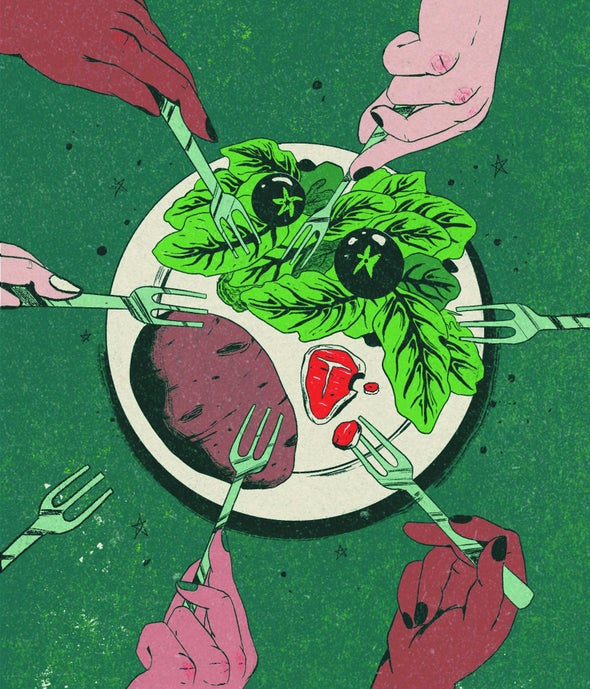Why Eating Beef Is Affecting the Climate Change

When I give public lectures almost the climate crunch, the most mutual question people pose is: "Are you an optimist or a pessimist?" My answer is yes. California has accomplished dramatic emissions reductions in a thriving economy, which makes me hopeful, yet in general the fossil-fuel manufacture is determined not to modify. The second most mutual question is: "What can I, personally, do?
That's a tough one. The major drivers of climatic change are collective enterprises such as power grids, industry, big-scale agriculture and transportation systems. Near half of all greenhouse gas emissions comes from electricity generation and industrial fossil-fuel employ. Substantial emissions reductions in these settings well-nigh likely will not come from personal deportment; they will come up from laws and policies such as carbon-pricing systems, revised building codes and supports for dark-green investment.
Some people have argued that calls for individual activity actually distract us from corporate responsibility. That could explicate why the fossil-fuel manufacture is enamored of such entreaties. Oil giant BP popularized and promoted the idea of a carbon footprint, deflecting attention to its customers who, it suggests, should have personal responsibility by lowering their carbon footprints. I study institute that focusing on individual activity actually undermines support for more than effective policy initiatives such as a carbon taxation.
Another problem with personal behavior is that people do not like to be told what to practise. Equally former congressperson Bob Inglis of South Carolina (a conservative) said in the documentary Merchants of Doubtfulness, people think, "Yous're saying that I shouldn't have this business firm in a suburb? I shouldn't be driving this car?"
Yet individual acts can grow into influential group activity. Information technology is like shooting fish in a barrel to feel helpless in the face of the force of the fossil-fuel behemoth or to think that calling your congressperson is a meaningless gesture, especially when you learn near the billions of dollars the industry and its allies have spent trying to cake Congress from acting. But 1 effective act, and one that tin can exist amplified, is to eat less red meat.
Cut meat consumption is a powerful and personal thing virtually Americans can do to tackle the climate crisis, and they can practice it immediately. About 40 percent of greenhouse gases come up from agriculture, deforestation and other country-utilize changes. Meat—particularly beefiness—drives climate change in two ways: start, through cows' emission of methane, a potent greenhouse gas, and second, past destroying forests every bit they are converted to grazing state. Despite the economic slowdown acquired by the COVID pandemic, atmospheric greenhouse gas levels continued to rising in 2020, in large part because of an emissions increase in the Amazon every bit rain forests were changed into land for cattle to satisfy the global need for beef. By eating less beef, nosotros can start to decrease that demand.
You practise not have to become a vegan to do this. Co-ordinate to ane recent study, if every person in the U.Due south. cut their meat consumption by 25 per centum, it would reduce almanac greenhouse gas emissions by one percent. That might not sound like a lot, simply it would help protect the rain wood, so the positive effects—including reduced water and fertilizer use, improved biodiversity and safeguarded rights of Indigenous peoples—would be amplified.
Perhaps most important, social activity is contagious—in a expert way. If lots of us brainstorm to eat less meat and if we talk about information technology constructively, we will likely influence others. Pretty before long the 1 pct reduction becomes 2 percent or more. Reduced demand for meat could motivate my local supermarket to carry meliorate produce, making information technology easier for me and my neighbors to set a few more than satisfying meat-free meals. Ultimately changes in demand will influence manufacture. 40 years ago few mainstream supermarkets carried organic products; at present nearly all do. Consumer need did that.
Cut dorsum on red meat also has the added benefit of beingness adept for your health. So while I wouldn't advise governments to order people to stop eating hamburgers, if anyone asks, "What can I do?," a simple and accurate answer is: "Eat less meat. Information technology's in your control, and you can brainstorm right now. It benefits both you and the planet."
This article was originally published with the title "Swallow to Save the Planet" in Scientific American 326, 1, 78 (Jan 2022)
doi:10.1038/scientificamerican0122-78
fairbanksmandiess.blogspot.com
Source: https://www.scientificamerican.com/article/eating-less-red-meat-is-something-individuals-can-do-to-help-the-climate-crisis/#:~:text=Meat%E2%80%94particularly%20beef%E2%80%94drives%20climate,are%20converted%20to%20grazing%20land.

Belum ada Komentar untuk "Why Eating Beef Is Affecting the Climate Change"
Posting Komentar